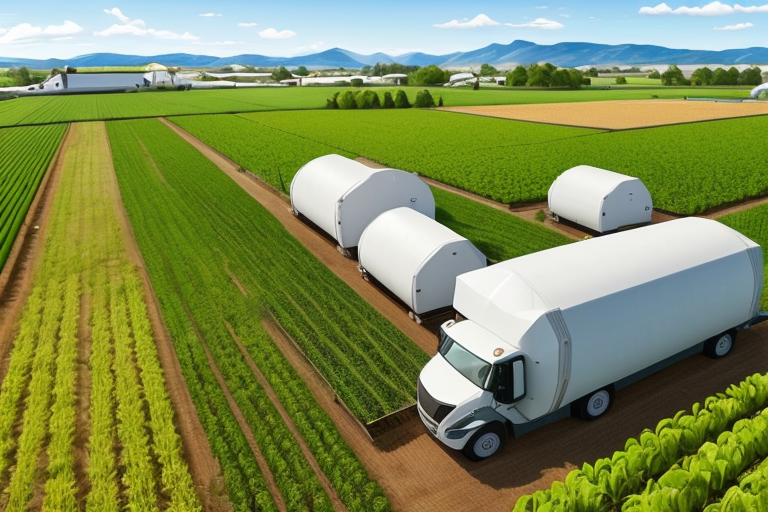The Importance of Agriculture Industry and the Need for New Technologies
Agriculture is the backbone of our civilization, providing food, fiber, and fuel for the world’s population. It is a vital industry that employs millions of people worldwide, contributing to economic growth and development. However, the agriculture industry faces numerous challenges, including climate change, water scarcity, and soil degradation, among others. These challenges have made it necessary to adopt new technologies that can help farmers overcome these obstacles and improve their yields.
One of the most promising technologies that can revolutionize the agriculture industry is blockchain. Blockchain is a decentralized, secure, and transparent ledger that can record transactions and data in a tamper-proof manner. It has the potential to transform the way we produce, distribute, and consume food, making the agriculture industry more efficient, sustainable, and profitable.
Blockchain technology can help farmers and other stakeholders in the agriculture industry by providing them with a reliable and transparent supply chain. By using blockchain, farmers can track their products from the farm to the consumer, ensuring that the food is safe, healthy, and of high quality. Blockchain can also help farmers reduce waste, improve logistics, and increase their profits.
Introduction to Blockchain Technology
Blockchain technology is a distributed ledger that records transactions and data in a secure and transparent manner. It is a decentralized system that does not require intermediaries, such as banks or governments, to verify transactions. Instead, it uses a network of computers to validate and store data, making it tamper-proof and resistant to fraud.
Blockchain technology has several features that make it suitable for the agriculture industry. First, it is transparent, meaning that all parties involved in a transaction can see the data recorded on the blockchain. Second, it is secure, meaning that the data recorded on the blockchain is tamper-proof and cannot be altered without the consensus of the network. Finally, it is decentralized, meaning that there is no central authority controlling the blockchain, making it more democratic and accessible to everyone.
Blockchain technology has the potential to transform the agriculture industry by providing transparency, security, and efficiency. In the next section, we will discuss how blockchain can help create a transparent and reliable food supply chain, and the benefits of using blockchain in the agriculture industry.
The Struggles of Traditional Agriculture
Agriculture is one of the oldest industries in the world, and yet it is still plagued by a multitude of issues. For traditional farmers, the struggle to maintain a reliable and transparent food supply chain is a constant battle. From crop failures to supply chain disruptions, the agriculture industry is rife with challenges that can make it difficult for farmers to make a living.
One of the biggest issues facing traditional farmers is the lack of transparency and traceability in the food supply chain. Without a reliable way to track the movement of food from farm to table, it can be difficult to ensure that food is safe and of high quality. This is where blockchain technology comes in.
Blockchain technology provides a way to create a transparent and reliable food supply chain. By using blockchain, farmers can track the movement of their crops from the field to the store shelves. This allows for greater transparency and traceability, which can help to improve food safety and quality.
In addition to improving transparency and traceability, blockchain technology can also help to reduce the costs associated with financial transactions. By using blockchain, farmers can reduce the time and costs associated with traditional financial transactions such as loan applications and insurance claims.
The benefits of using blockchain technology in the agriculture industry are numerous. For example, by using blockchain to track crops, livestock, and soil moisture content, farmers can optimize crop yields and improve farming practices. This can lead to higher profits and a more sustainable agriculture industry.
Another benefit of using blockchain technology in agriculture is the ability to create direct marketplaces for small-scale farmers. By using blockchain-based marketplaces, small-scale farmers can access new markets and sell their products directly to consumers. This can help to increase profits and create a more sustainable agriculture industry.
Overall, the use of blockchain technology in the agriculture industry has the potential to revolutionize the way we produce and consume food. By creating a transparent and reliable food supply chain, optimizing agricultural practices, and creating new marketplaces for small-scale farmers, blockchain technology can help to create a more sustainable and profitable agriculture industry.
Financial Transactions Using Blockchain
Blockchain technology has the potential to revolutionize the way we conduct financial transactions, and the agriculture industry is no exception. By using blockchain, farmers and other industry players can enjoy faster, more secure, and cost-effective financial transactions.
One of the main advantages of blockchain technology is its ability to increase efficiency and reduce transaction costs. Transactions on a blockchain network can be completed in a matter of seconds, without the need for intermediaries such as banks or other financial institutions. This means that farmers can save time and money by avoiding the fees and delays associated with traditional financial transactions.
Moreover, blockchain technology can be used to secure loans and insurance. By using smart contracts, farmers can easily access loans and insurance policies that are tailored to their specific needs. These contracts are self-executing, meaning that they automatically execute when certain conditions are met, without the need for intermediaries. This can save farmers time and money, as well as reduce the risk of fraud and errors.
Frankie, a small-scale farmer from rural America, is one of the many farmers who have benefited from using blockchain technology for financial transactions. Frankie used to struggle with securing loans and insurance, as the process was often slow and cumbersome. However, after adopting blockchain technology, Frankie was able to access loans and insurance policies that were tailored to his specific needs, without the need for intermediaries.
In addition to its financial benefits, blockchain technology can also provide greater transparency and traceability in the agriculture industry. By using blockchain, farmers can track the movement of their crops and livestock, from farm to table. This can help to ensure that food is safe, reliable, and of high quality.
Overall, the benefits of using blockchain technology in the agriculture industry are clear. By increasing efficiency, reducing costs, and providing greater transparency and traceability, blockchain technology has the potential to revolutionize the way we produce and consume food. As the son of a farmer, I am excited to see how blockchain technology can help to improve the lives of farmers and their families, both in the United States and around the world.
Optimizing Agriculture with Blockchain Technology
Blockchain technology has the potential to revolutionize the agriculture industry, not just by creating transparent and reliable food supply chains, but also by optimizing agricultural practices. By using blockchain to track crops, livestock, and soil moisture content, farmers can obtain valuable data that can help them make informed decisions and improve their farming practices.
One of the primary benefits of using blockchain technology for agriculture optimization is the ability to collect and analyze data in real-time. Farmers can use sensors to track soil moisture content, temperature, and other environmental factors, which can help them determine the optimal time to plant, water, and harvest their crops. By analyzing this data, farmers can make informed decisions about when to apply fertilizers, pesticides, and other treatments to their crops, which can help improve crop yields and reduce waste.
In addition to improving crop yields, blockchain technology can also help farmers optimize their livestock management practices. By tracking the health and well-being of their animals, farmers can identify potential health issues early on and take corrective action to prevent the spread of disease. This can help reduce the need for antibiotics and other treatments, which can be harmful to both animals and humans.
One of the most significant benefits of using blockchain technology for agriculture optimization is the ability to create more sustainable farming practices. By using data to optimize crop yields and reduce waste, farmers can reduce their environmental impact and create more sustainable farming practices. This can help reduce greenhouse gas emissions, conserve water resources, and protect biodiversity.
Frankie Uvanni, a farmer from California, has been using blockchain technology to optimize his farming practices. By tracking soil moisture content and other environmental factors, he has been able to reduce water usage and improve crop yields. “Blockchain technology has been a game-changer for me,” he says. “It has allowed me to make informed decisions about when to plant, water, and harvest my crops, which has helped me reduce waste and improve my bottom line.”
Revolutionizing Access to Markets for Small-Scale Farmers
Blockchain-based marketplaces are changing the way small-scale farmers access new markets and sell their products. These marketplaces provide a direct connection between farmers and consumers, cutting out intermediaries and increasing profitability for farmers like Frankie. By using blockchain technology to create a transparent and secure platform, these marketplaces are able to ensure fair trade practices and provide consumers with access to locally sourced, high-quality products.
For family-owned farms like Frankie’s, these marketplaces offer a unique opportunity to expand their customer base and increase revenue. With the ability to sell directly to consumers, farmers can cut out the middlemen and keep more of the profits for themselves. This is especially important for small-scale farmers who often struggle to compete with larger, industrialized farms.
In addition to providing access to new markets, blockchain-based marketplaces also offer a number of other benefits for small-scale farmers. By using smart contracts to automate transactions, farmers can save time and reduce the risk of fraud or disputes. This can be especially helpful for farmers who may not have the resources to hire legal representation or navigate complex legal systems.
Another benefit of these marketplaces is the potential for increased transparency and accountability in the agriculture industry. By using blockchain technology to track the supply chain, consumers can be confident that the products they are buying are ethically sourced and meet certain quality standards. This can help to build trust between consumers and farmers, and may even lead to increased demand for locally sourced, sustainable products.
Of course, there are still challenges that need to be addressed in order to fully realize the potential of blockchain-based marketplaces for small-scale farmers. One of the biggest challenges is ensuring that these marketplaces are accessible to all farmers, regardless of their level of technological expertise or access to resources. This may require additional support and education for farmers who are new to these platforms.
Another challenge is the need for regulation and oversight to ensure fair trade practices and prevent fraud. This is where the potential for blockchain technology to act as a judge comes into play. By using blockchain to create a transparent and secure platform, regulators and other stakeholders can monitor transactions and ensure that farmers are being paid fairly for their products.
Despite these challenges, the potential benefits of blockchain-based marketplaces for small-scale farmers are clear. By providing direct access to new markets and increasing transparency and accountability in the agriculture industry, these marketplaces have the potential to revolutionize the way we think about food production and consumption. As we continue to explore the possibilities of blockchain technology, it is important that we prioritize the needs and interests of small-scale farmers like Frankie and his family.
Blockchain-based Marketplaces: Empowering Small-Scale Farmers
The agriculture industry has long been dominated by large-scale operations, leaving small-scale farmers struggling to compete. However, blockchain technology is changing that by providing a platform for small-scale farmers to connect with consumers directly.
Blockchain-based marketplaces allow farmers to sell their products online, cutting out intermediaries and creating a more transparent and equitable food system. These marketplaces also provide consumers with access to locally grown produce, which is often fresher and more sustainable than products shipped from other regions or countries.
One of the main benefits of blockchain-based marketplaces for small-scale farmers is increased profitability. By eliminating intermediaries, farmers can charge higher prices for their products, which translates to higher profits. Additionally, these marketplaces provide farmers with access to a larger customer base, which can help them expand their businesses and increase their revenue.
Another benefit of blockchain-based marketplaces is increased transparency. Consumers can trace the origin of their food back to the farm where it was grown, ensuring that they are purchasing products that are ethically and sustainably produced. This transparency also helps build trust between farmers and consumers, which can lead to increased sales and customer loyalty.
In addition to providing a platform for small-scale farmers to sell their products, blockchain-based marketplaces also offer a range of tools and resources to help farmers improve their businesses. For example, these marketplaces often provide farmers with access to data analytics tools that can help them track their sales and optimize their pricing strategies.
Overall, blockchain-based marketplaces have the potential to revolutionize the agriculture industry by empowering small-scale farmers and creating a more equitable food system. As consumers become more conscious of the environmental and social impact of their food choices, these marketplaces will play an increasingly important role in connecting consumers with ethically and sustainably produced products.









